What Is ERC-6551? The New Standard For The NFT Revolution
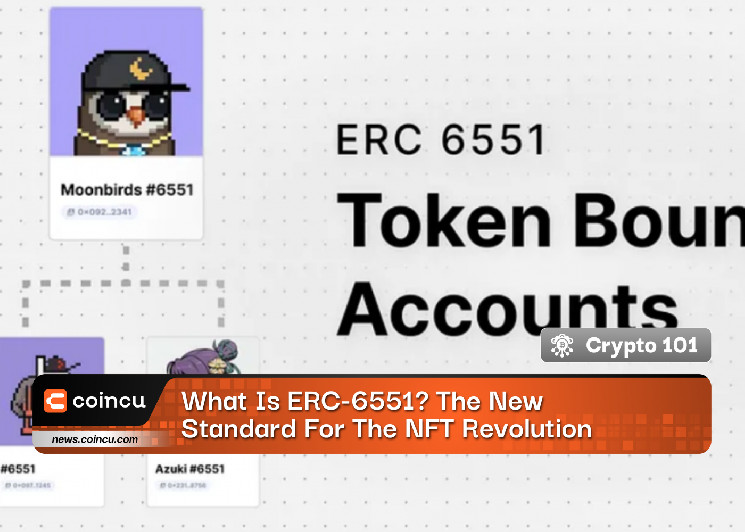
What is ERC-6551?
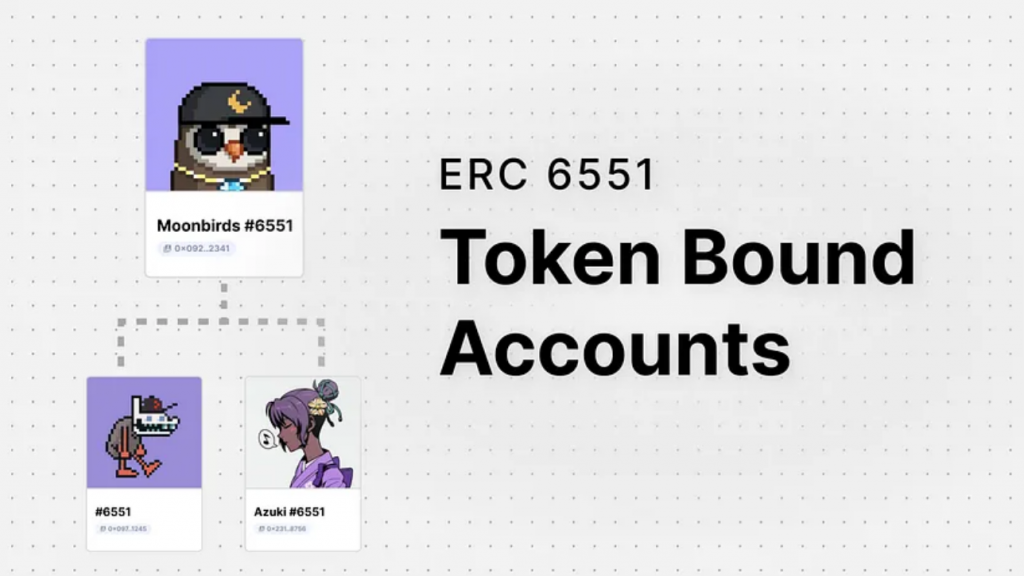
ERC-6551 is the new token standard for non-fungible tokens (NFTs) that is supposed to become a game changer for the scene. The ERC-6551 enhances the functionality and value of NFTs by providing them with smart contract capabilities.
Proposed ERC-6551 is a new token standard that significantly enhances the functionality of ERC-721 (NFT) and is released on the Ethereum mainnet on May 7, 2023: via ERC-6551, a or multiple smart contract wallets, making it more responsive, dynamic, and interactive. Simply put, the ERC-6551 turns the NFT into an addressable wallet.
That means ERC-6551 can hold tokens and other NFTs just like a regular smart contract wallet. The same applies to transactions, and this so-called token federated account (TBA) created and managed through a permissionless registry is compatible with existing ERC-721 NFTs.
These wallets are called “Token Bounded Accounts” or TBA for short (control of TBA is delegated to NFT holders, meaning NFT holders can use TBA to initiate on-chain operations). Token Bounded Accounts (TBA) are common contract accounts the NFT controls. TBA can do everything a regular wallet can and is compatible with any NFT a user owns. This means that each NFT will be permanently tied to a wallet called Token Bounded Accounts.
The idea was co-authored by Benny Giang, a founding member of Dapper Labs, who has worked on the ERC-721 token standard and early projects like CryptoKitties.
How does ERC-6551 work?
The problem with conventional ERC-721 NFTs is their limited range. They can only be owned and transferred and cannot own other assets, such as tokens or other NFTs. Furthermore, they cannot interact with other smart contracts or change or evolve based on external factors or user input.
The ERC-6551 uses a disallowed registry compatible with the existing ERC-721 NFT to work around this issue. A registry is a smart contract that acts as a factory and a directory for TBAs. Anyone can generate a TBA for any ERC-721 token by calling a function on the registry and paying a small fee. The registry then deploys an authorization contract that acts as the TBA for the token.
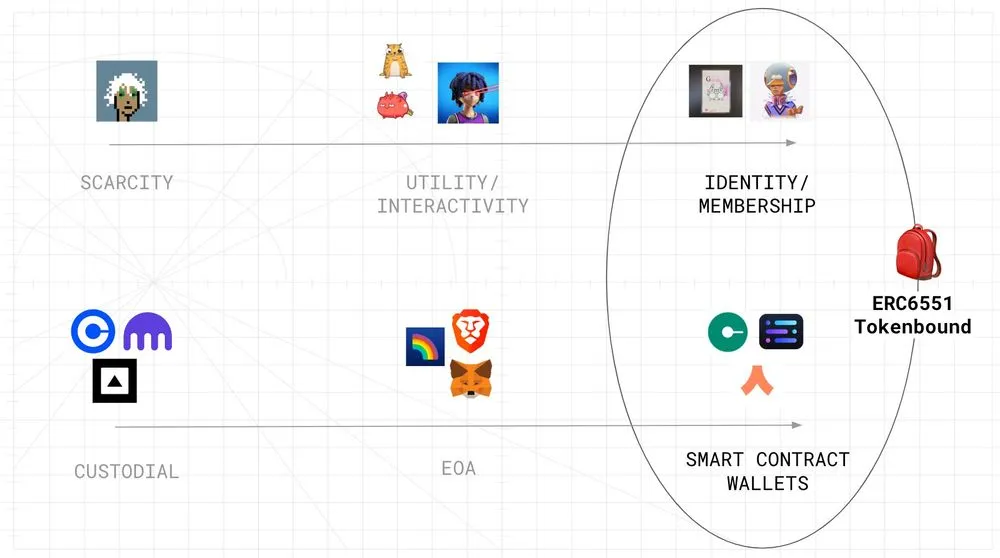
The authorization contract represents the TBA inheriting all the properties and metadata of the original ERC-721 token. It also implements the EIP-1271 standard, allowing it to sign messages and verify signatures on behalf of tokens. This enables the TBA to interact with other smart contracts and accounts on the Ethereum network, such as decentralized exchanges (DEXs), lending platforms, game environments, and more.
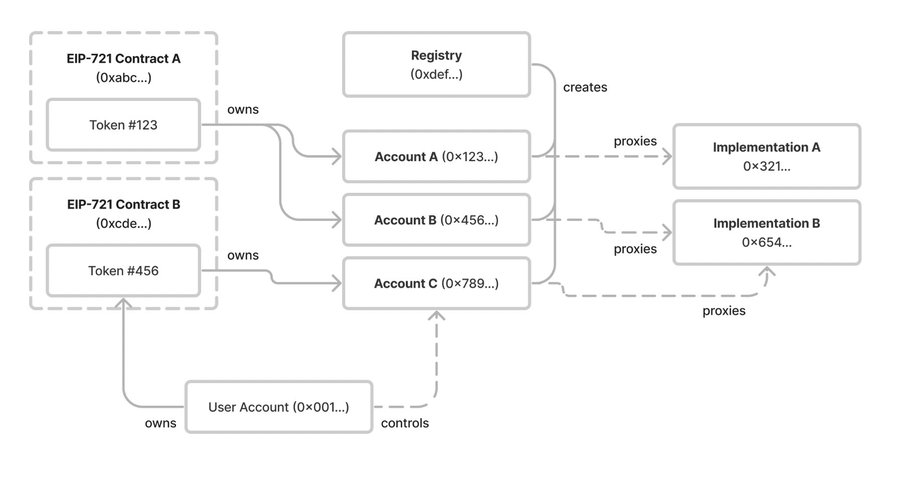
The following diagram illustrates the relationship between ERC-721 tokens, ERC-721 token owners, token bound accounts, and the Registry
The TBA may also contain other assets, such as tokens or NFTs. These assets can be transferred to or from the TBA by calling functions on the authorization contract.
Application of ERC-6551 When Applied to NFT
Ability to combine
The ERC-6551 allows NFTs to be combined or with other assets to create new and unique digital products. This can be used to create NFT-based artwork, music, or games. You can also pool your NFT with its related assets, such as other NFTs and tokens, into one profile. Any assets therein will be transferred if you sell or transfer the ERC-6551 NFT.
Empowering Users in the Gaming Space
ERC-6551 can completely change the experience when playing Web3 games. Everything will be simplified, bringing closer and more vivid when playing games. For example, players can use their NFT to purchase in-game items or to customize their character.
Identity
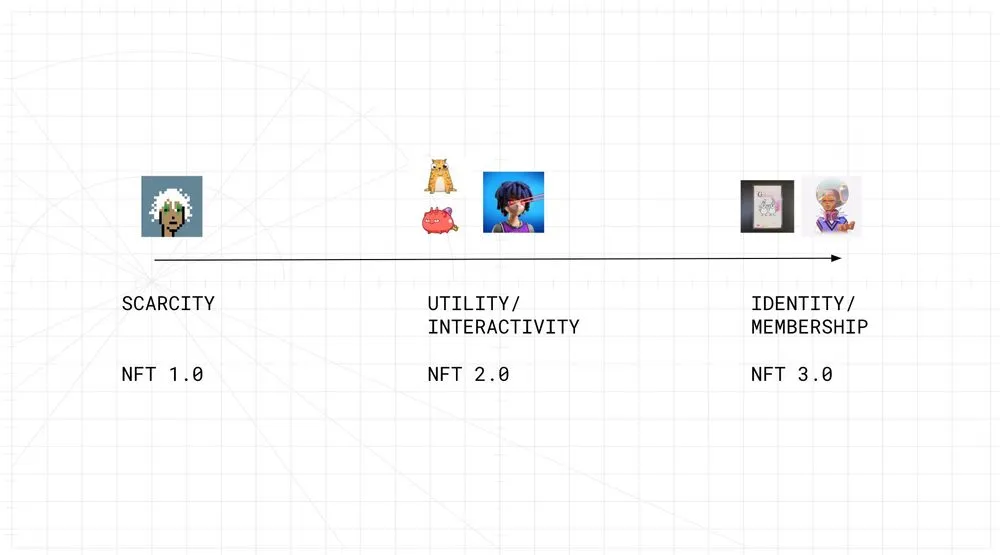
With this new standard, NFT can interact with dApps independently without relying on the wallet containing it. Therefore, NFT can represent a user’s digital identity and open up new possibilities for Unsecured loans, loyalty programs, or in-game rewards based on behavior in the past process of the NFT.
This can also impact the value of NFTs held by users as platforms can use the identity and reputation of a user’s NFT to determine trustworthiness or reduce risk to the platform.
Dependency
The dependency that your NFT can interact with other on-chain assets or platforms means its functionality and value. An ERC-6551 NFT can own other assets or tokens to enhance performance or appearance and interact with different platforms or smart contracts. This is akin to the NFT having its on-chain personality and story, which makes the NFT more interactive.
The benefits of ERC-6551
Enhanced security for NFT
One of the critical aspects of the ERC-6551 is its focus on enhancing security for the NFT. With the growing popularity of digital assets, it is essential to have strong security measures in place. The ERC-6551 standard helps NFTs interact directly with Web3 applications instead of going through a third-party application, which allows users to reduce the risk of users’ digital assets.
Improved functionality for NFT
Not only in terms of security, this new standard also brings functional improvements to NFT. The creation of the new standard ERC-6551 with a combination of ERC-721 and TBA opens up new use cases that most project creators want to add but haven’t found an easy way to do on-chain:
Enhance interoperability
NFT, according to the ERC-6551 standard, can be used across many platforms and applications, and this makes them more flexible and accessible to a wider range of users.
Challenges faced by ERC-6551
Lack of support
The ERC-6551 standard still needs to be widely supported by NFT platforms and markets due to technical difficulties or business reasons. This means that users interested in the ERC-6551 NFT may need more choices.
Besides, not all NFT projects conform to the ERC-6551 standard, especially those that don’t follow the owner’s method, like CryptoPunks. Some of the most popular and valuable NFTs cannot enjoy the token-bound account feature.
High fee
Generating and minting ERC-6551 NFTs can be more expensive than traditional ERC-721 NFTs. This is because the ERC-6551 NFT requires creating a new intelligent contract account, which may require fees and resources for implementation.
Security issues
The ERC-6551 NFT is still new and has not been tested extensively, and this poses the risk of bugs and security holes. As the ERC-6551 standard continues to evolve in the future, it is expected that these risks will be minimized.
Intuitive and user-friendly experience
The ERC-6551 introduces a new layer of complexity and functionality to the NFT. It also requires a new level of understanding and awareness from users who want to use them effectively. For example, users may need to learn how to create, access, manage, and transfer accounts associated with their tokens and assets.
Conclusion
ERC-6551 can revolutionize the NFT world. It gives each ERC-721 token a smart contract wallet that can own assets and interact with applications, making NFT more dynamic and interactive.
Its applications can open up new gaming, art, and identity possibilities but are not without challenges, such as compatibility and adoption.
On the other hand, when there is enough time for research and implementation, the difficulties faced by this new standard are relatively easy to overcome. Therefore, ERC-6551 could be needed to revive the NFT market in 2023.
DISCLAIMER: The Information on this website is provided as general market commentary and does not constitute investment advice. We encourage you to do your own research before investing.






 Bitcoin
Bitcoin  Ethereum
Ethereum  Tether
Tether  USDC
USDC  TRON
TRON  Dogecoin
Dogecoin  Cardano
Cardano  Bitcoin Cash
Bitcoin Cash  Chainlink
Chainlink  Zcash
Zcash  Monero
Monero  LEO Token
LEO Token  Stellar
Stellar  Litecoin
Litecoin  Hedera
Hedera  Cronos
Cronos  Dai
Dai  OKB
OKB  Tether Gold
Tether Gold  Ethereum Classic
Ethereum Classic  KuCoin
KuCoin  Algorand
Algorand  Gate
Gate  Cosmos Hub
Cosmos Hub  VeChain
VeChain  Stacks
Stacks  Tezos
Tezos  Dash
Dash  TrueUSD
TrueUSD  IOTA
IOTA  Basic Attention
Basic Attention  Theta Network
Theta Network  Decred
Decred  NEO
NEO  Synthetix
Synthetix  Qtum
Qtum  Ravencoin
Ravencoin  0x Protocol
0x Protocol  DigiByte
DigiByte  Zilliqa
Zilliqa  Holo
Holo  Nano
Nano  Siacoin
Siacoin  Numeraire
Numeraire  Waves
Waves  Enjin Coin
Enjin Coin  Ontology
Ontology  Status
Status  BUSD
BUSD  Hive
Hive  Lisk
Lisk  Pax Dollar
Pax Dollar  Steem
Steem  Huobi
Huobi  OMG Network
OMG Network  NEM
NEM  Bitcoin Gold
Bitcoin Gold  Augur
Augur  Ren
Ren